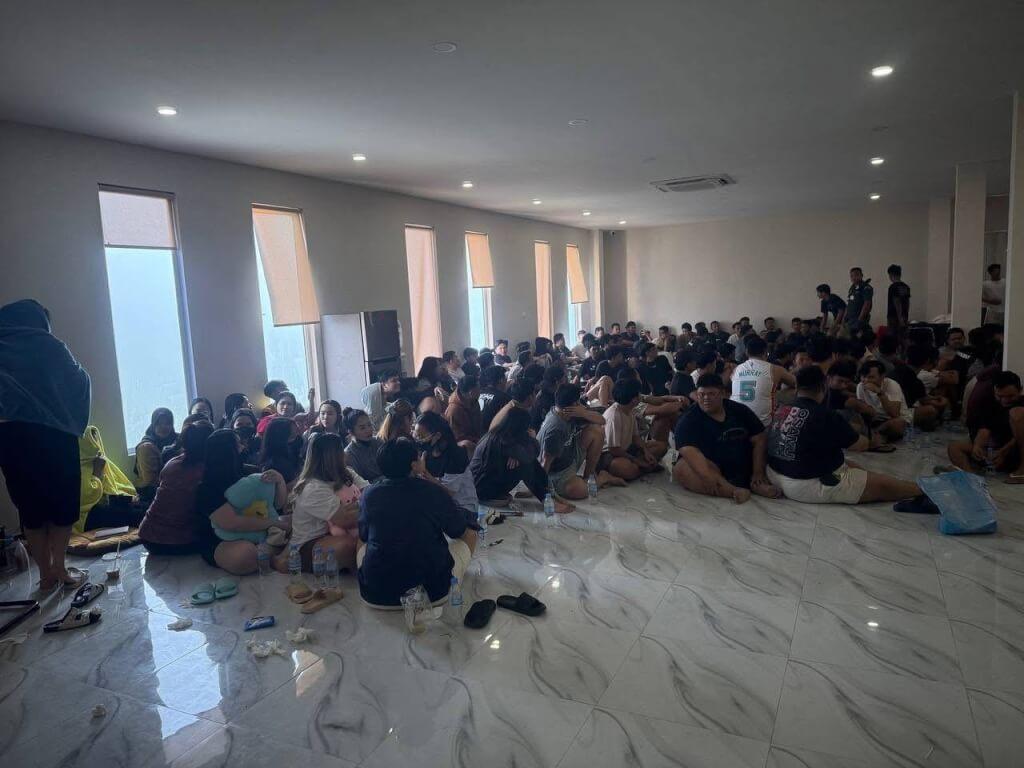Cambodian authorities have arrested more than 1,000 people, including 75 Taiwanese, in raids on internet scam centers, police said yesterday, as Prime Minister Hun Manet ordered a crackdown on cybercrime sweatshops.
The UN has described Southeast Asia as the “ground zero” of scam centers, where workers typically use romance or business cons to defraud social media users of an estimated US$40 billion annually.
Hun Manet issued a directive made public on Tuesday, telling law enforcement and the military “to prevent and crack down on online scams,” warning they risk losing their jobs if they fail to take action.

Photo: screen grab from Cambodian National Police’s Facebook page
Over three days, authorities raided sites across the country, including in the capital Phnom Penh, the border city of Poipet and the coastal city of Sihanoukville.
Just over 1,000 suspects were detained, according to police reports, which continued to be announced late yesterday night.
The vast majority of the reported arrests were foreign nationals — including at least 271 Indonesians, 213 Vietnamese and 75 Taiwanese.
Many of those freed from Southeast Asian scam centers say they were trafficked or lured there under false pretences.
Abuses in Cambodia’s scam centers are happening on a “mass scale,” Amnesty International said in a report published last month.
There are at least 53 scam compounds in Cambodia where organized criminal groups carry out human trafficking, forced labor, child labor, torture, deprivation of liberty and slavery, the report said.
In March, Cambodia deported 119 Thais — among 230 foreign nationals detained during raids on alleged cyber-scam centers in Poipet.
The UN Office on Drugs and Crime warned in April that the scam industry was expanding outside hotspots in Southeast Asia, with criminal gangs building up operations as far as South America, Africa, the Middle East, Europe and some Pacific islands.

Taiwan has received more than US$70 million in royalties as of the end of last year from developing the F-16V jet as countries worldwide purchase or upgrade to this popular model, government and military officials said on Saturday. Taiwan funded the development of the F-16V jet and ended up the sole investor as other countries withdrew from the program. Now the F-16V is increasingly popular and countries must pay Taiwan a percentage in royalties when they purchase new F-16V aircraft or upgrade older F-16 models. The next five years are expected to be the peak for these royalties, with Taiwan potentially earning

STAY IN YOUR LANE: As the US and Israel attack Iran, the ministry has warned China not to overstep by including Taiwanese citizens in its evacuation orders The Ministry of Foreign Affairs (MOFA) yesterday rebuked a statement by China’s embassy in Israel that it would evacuate Taiwanese holders of Chinese travel documents from Israel amid the latter’s escalating conflict with Iran. Tensions have risen across the Middle East in the wake of US and Israeli airstrikes on Iran beginning Saturday. China subsequently issued an evacuation notice for its citizens. In a news release, the Chinese embassy in Israel said holders of “Taiwan compatriot permits (台胞證)” issued to Taiwanese nationals by Chinese authorities for travel to China — could register for evacuation to Egypt. In Taipei, the ministry yesterday said Taiwan

‘LIKE-MINDED PARTNER’: Tako van Popta said it would be inappropriate to delay signing the deal with Taiwan because of China, adding he would promote the issue Canadian senators have stressed Taiwan’s importance for international trade and expressed enthusiasm for ensuring the Taiwan-Canada trade cooperation framework agreement is implemented this year. Representative to Canada Harry Tseng (曾厚仁) in an interview with the Central News Agency (CNA) said he was increasingly uneasy about Ottawa’s delays in signing the agreement, especially as Ottawa has warmed toward Beijing. There are “no negotiations left. Not only [is it] initialed, we have three versions of the text ready: English, French and Mandarin,” Tseng said. “That tells you how close we are to the final signature.” Tseng said that he hoped Canadian Prime Minister Mark Carney

POSITIVE DEVELOPMENT: Japan and the US are expected to hold in-depth discussions on Taiwan-related issues during the meeting next month, Japanese sources said The holding of a Japan-US leaders’ meeting ahead of US President Donald Trump’s visit to China is positive news for Taiwan, former Japan-Taiwan Exchange Association representative Hiroyasu Izumi said yesterday. After the Liberal Democratic Party’s landslide victory in Japan’s House of Representatives election, Japanese Prime Minister Sanae Takaichi is scheduled to visit the US next month, where she is to meet with Trump ahead of the US president’s planned visit to China from March 31 to April 2 for a meeting with Chinese President Xi Jinping (習近平). Japan and the US are expected to hold in-depth discussions on Taiwan-related issues during the